'Absolutely logical' Japan's Fukushima water release draws interest: IAEA chief
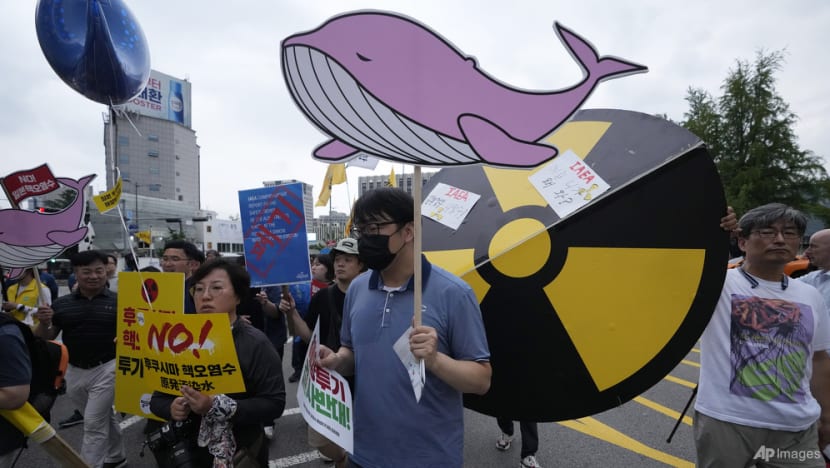
Protesters march toward the Japanese Embassy during rally against the Japanese government's decision to release treated radioactive water from the damaged Fukushima nuclear power plant, in Seoul, South Korea, Saturday, July 8, 2023. (AP Photo/Ahn Young-joon)
09 Jul 2023
SEOUL: It is "absolutely logical" that Japan's plan to release treated radioactive water from its Fukushima nuclear plant is attracting great interest in the region, the head of the International Atomic Energy Agency (IAEA), Rafael Grossi, said on Sunday (Jul 9).
Grossi also said he understands concerns remain over the plan but added that a review by the IAEA released last week found it was "in conformity with international safety standards" if executed according to plan.
Grossi met with South Korea's opposition Democratic Party members on Sunday who expressed strong public concerns over Japan's plan and criticised the IAEA's findings.
"The issue at hand today has attracted a lot of interest, and this is absolutely logical because the actions and the way in which Japan will be addressing this ... have important implications," Grossi said in the meeting.
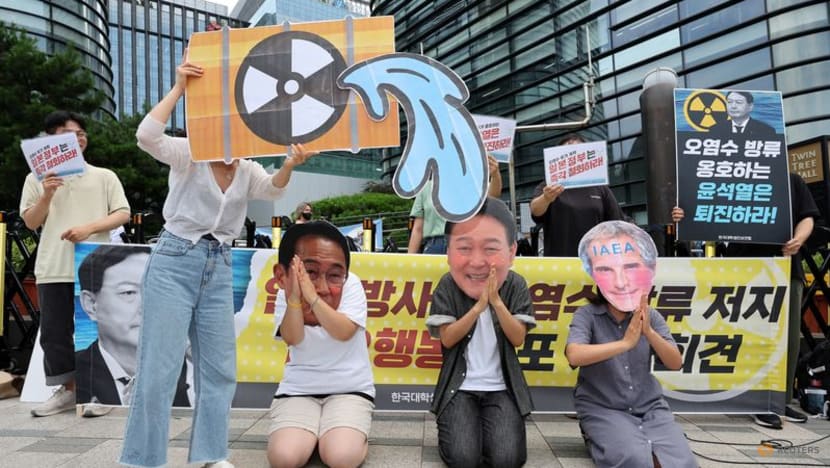
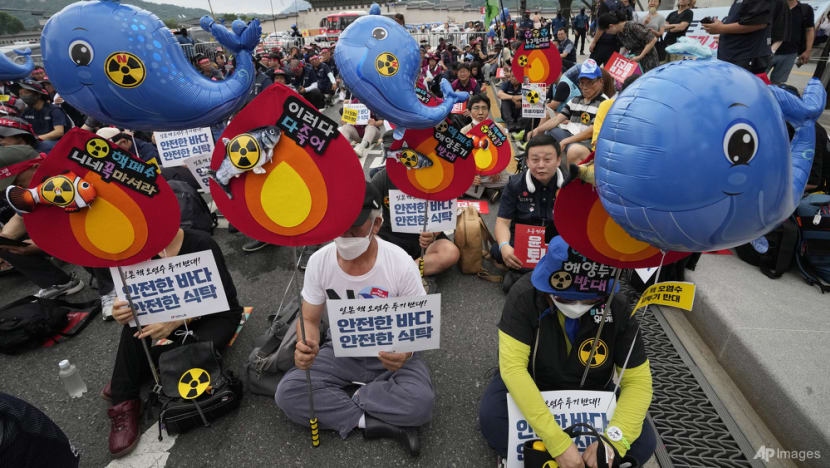

Protesters march toward the Japanese Embassy during rally against the Japanese government's decision to release treated radioactive water from the damaged Fukushima nuclear power plant, in Seoul, South Korea, Saturday, July 8, 2023. (AP Photo/Ahn Young-joon)
09 Jul 2023
SEOUL: It is "absolutely logical" that Japan's plan to release treated radioactive water from its Fukushima nuclear plant is attracting great interest in the region, the head of the International Atomic Energy Agency (IAEA), Rafael Grossi, said on Sunday (Jul 9).
Grossi also said he understands concerns remain over the plan but added that a review by the IAEA released last week found it was "in conformity with international safety standards" if executed according to plan.
Grossi met with South Korea's opposition Democratic Party members on Sunday who expressed strong public concerns over Japan's plan and criticised the IAEA's findings.
"The issue at hand today has attracted a lot of interest, and this is absolutely logical because the actions and the way in which Japan will be addressing this ... have important implications," Grossi said in the meeting.

Students wearing masks featuring Japanese Prime Minister Fumio Kishida, South Korean President Yoon Suk-yeol and International Atomic Energy Agency (IAEA) chief Rafael Grossi attend a protest against Japan's plan to discharge treated radioactive water from the tsunami-wrecked Fukushima plant into the ocean, in Seoul, South Korea, Jul 7, 2023. (Photo: Reuters/Yonhap)
A Democratic Party member who chairs a special committee on the issue said the IAEA's findings had "shortcomings", and the widespread public concerns over safety in the country were "legitimate and reasonable".
"We deeply regret that the IAEA concluded Japan's plan to discharge contaminated water from the Fukushima nuclear power plant meets international standards," Wi Seong-gon, the committee chairman, told Grossi.
Grossi was met with angry protests by civic groups as he arrived in South Korea on Friday from Japan and drew street rallies on Saturday criticising the plan.
South Korea's government said on Friday it respected the IAEA's report and that its own analysis had found the release will not have "any meaningful impact" on its waters.
A Democratic Party member who chairs a special committee on the issue said the IAEA's findings had "shortcomings", and the widespread public concerns over safety in the country were "legitimate and reasonable".
"We deeply regret that the IAEA concluded Japan's plan to discharge contaminated water from the Fukushima nuclear power plant meets international standards," Wi Seong-gon, the committee chairman, told Grossi.
Grossi was met with angry protests by civic groups as he arrived in South Korea on Friday from Japan and drew street rallies on Saturday criticising the plan.
South Korea's government said on Friday it respected the IAEA's report and that its own analysis had found the release will not have "any meaningful impact" on its waters.

Protesters stage a rally against the Japanese government's decision to release treated radioactive water from the damaged Fukushima nuclear power plant, in Seoul, South Korea, Jul 8, 2023.
(Photo: AP/Ahn Young-joon)
Chinese foreign ministry spokesman Wang Wenbin on Wednesday criticised the move towards discharging the water and threatened action if the plan should move ahead.
North Korea also criticised IAEA's backing of Japan's plan, calling it "unjust" and a demonstration of double standards, citing the UN nuclear watchdog's work to curb Pyongyang's nuclear programme.
North Korea has faced UN Security Council sanctions for its six underground nuclear tests.
Chinese foreign ministry spokesman Wang Wenbin on Wednesday criticised the move towards discharging the water and threatened action if the plan should move ahead.
North Korea also criticised IAEA's backing of Japan's plan, calling it "unjust" and a demonstration of double standards, citing the UN nuclear watchdog's work to curb Pyongyang's nuclear programme.
North Korea has faced UN Security Council sanctions for its six underground nuclear tests.
Rafael Grossi traveled to South Korea to advocate for Japan's plan to release water from the Fukushima nuclear plant amid harsh criticism from the South Korean public and opposition party.
IAEA Chief Rafael Grossi was met by protesters upon arrival in South Korea
YONHAP NEWS AGENCY via REUTERS
Rafael Grossi, the director general of the International Atomic Energy Agency (IAEA), arrived in South Korea following his trip to Japan, in an attempt to allay concerns about Japan's plan to release treated radioactive water from the Fukushima nuclear plant.
Grossi's three-day visit included meetings with South Korea's foreign minister and a top nuclear safety official.

Rafael Grossi, the director general of the International Atomic Energy Agency (IAEA), arrived in South Korea following his trip to Japan, in an attempt to allay concerns about Japan's plan to release treated radioactive water from the Fukushima nuclear plant.
Grossi's three-day visit included meetings with South Korea's foreign minister and a top nuclear safety official.

Demonstrators criticized the IAEA for not being able to verify environmental standards
Yonhap/picture alliance
Upon arriving in South Korea, Grossi was met by protesters at Gimpo Airport in Seoul. Hundreds of protesters took to the streets in central Seoul, criticizing the IAEA's review as inadequate. Demonstrators held signs criticizing the IAEA and Japan's plan, with one stating, "IAEA is not qualified to verify environmental standards."
There had been "no disagreement" among experts involved in the review that gave the go-ahead for the decades-long project, the IAEA chief said in an interview with South Korea's Yonhap news agency.
"This is the final comprehensive report... No experts have come to me saying he or she disagrees on the contents," he said.
"It was a very thorough process."
Japan to release treated Fukushima wastewater into Pacific 02:43
Opposition wants to put halt to the plan
South Korea conducted an independent review of the plan and concluded that Japan would meet or exceed international standards, with the release having minimal environmental consequences.
During a press conference held in Japan, Grossi expressed his intention to also meet with South Korea's opposition party, which had been critical of the discharge plan.
The leader of the opposition Democratic Party, Lee Jae-myung, has urged the government to try to stop the plan, suggesting that it be taken to the International Tribunal for the Law of the Sea.
The South Korean government stated that it respected the IAEA's report. President Yoo Suk Yeol's administration has been cautious in its stance on Japan's proposal, aiming to foster better ties with Tokyo.
Nevertheless, the plan has sparked anger and concern among South Koreans, leading some individuals to stock up on sea salt. Despite South Korea giving its approval to the discharge plan, a ban on food and seafood products from the Fukushima region will remain active.
los/ab (AFP, Reuters)
Upon arriving in South Korea, Grossi was met by protesters at Gimpo Airport in Seoul. Hundreds of protesters took to the streets in central Seoul, criticizing the IAEA's review as inadequate. Demonstrators held signs criticizing the IAEA and Japan's plan, with one stating, "IAEA is not qualified to verify environmental standards."
There had been "no disagreement" among experts involved in the review that gave the go-ahead for the decades-long project, the IAEA chief said in an interview with South Korea's Yonhap news agency.
"This is the final comprehensive report... No experts have come to me saying he or she disagrees on the contents," he said.
"It was a very thorough process."
Japan to release treated Fukushima wastewater into Pacific 02:43
Opposition wants to put halt to the plan
South Korea conducted an independent review of the plan and concluded that Japan would meet or exceed international standards, with the release having minimal environmental consequences.
During a press conference held in Japan, Grossi expressed his intention to also meet with South Korea's opposition party, which had been critical of the discharge plan.
The leader of the opposition Democratic Party, Lee Jae-myung, has urged the government to try to stop the plan, suggesting that it be taken to the International Tribunal for the Law of the Sea.
The South Korean government stated that it respected the IAEA's report. President Yoo Suk Yeol's administration has been cautious in its stance on Japan's proposal, aiming to foster better ties with Tokyo.
Nevertheless, the plan has sparked anger and concern among South Koreans, leading some individuals to stock up on sea salt. Despite South Korea giving its approval to the discharge plan, a ban on food and seafood products from the Fukushima region will remain active.
los/ab (AFP, Reuters)
South Koreans protest against Japan’s Fukushima water release plan during IAEA chief’s visit
Editorial by SCMP
No room for mistakes with release of water from Fukushima
As Japan prepares to put plan at wrecked nuclear power station into action, the radiation concerns of neighbouring countries must be addressed
Published: 8 Jul, 2023
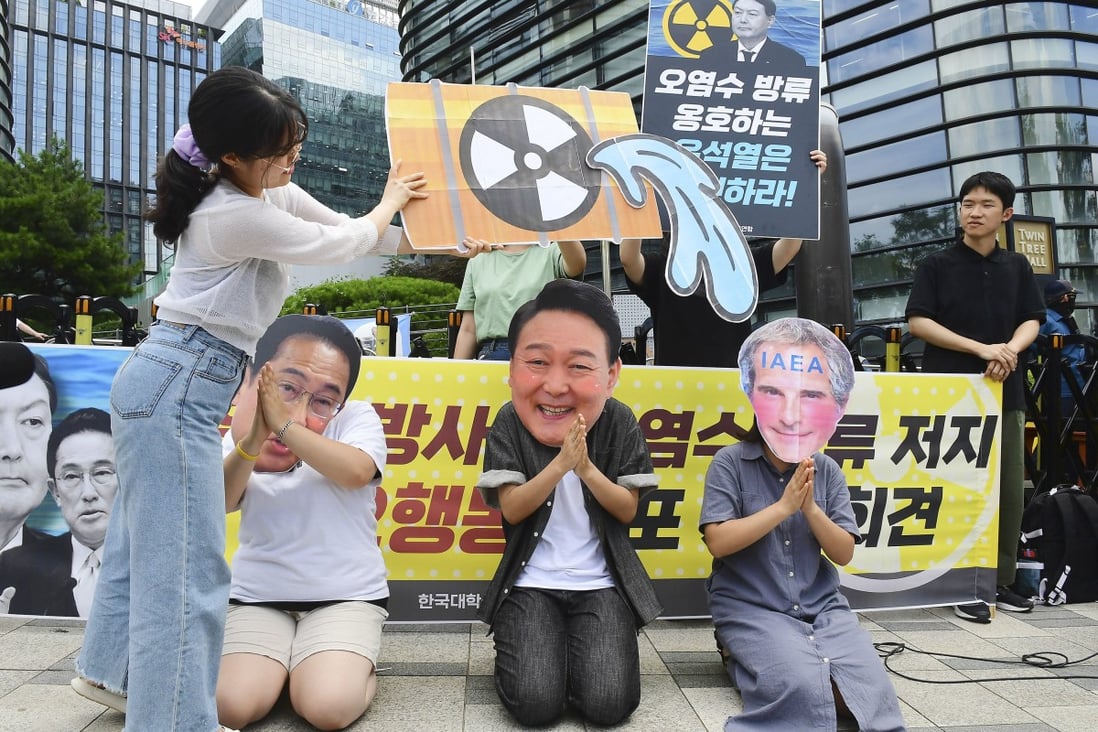
People gather near the Japanese Embassy in Seoul on Friday to protest against Japan’s plan to release treated radioactive water from the crippled Fukushima Daiichi nuclear power plant into the sea.
No room for mistakes with release of water from Fukushima
As Japan prepares to put plan at wrecked nuclear power station into action, the radiation concerns of neighbouring countries must be addressed
Published: 8 Jul, 2023

People gather near the Japanese Embassy in Seoul on Friday to protest against Japan’s plan to release treated radioactive water from the crippled Fukushima Daiichi nuclear power plant into the sea.
Photo: Kyodo
Radiation cannot be seen or felt, so it is often feared regardless of whether it exists at benign natural levels or dangerous doses.
It is understandable that grave concern has been raised by Japan’s plans to release radioactive water from its wrecked Fukushima Daiichi nuclear plant into the Pacific Ocean.
The water was contaminated while cooling three reactors that melted down after a massive 2011 earthquake and tsunami that hit the country’s coast killing thousands of people. For 12 years, the waste liquid has been stored on-site in 1,000 huge tanks that are now nearly full.
Japan has proposed resolving the crisis by filtering and diluting the water before releasing it through an underwater tunnel that stretches 1km (0.6 miles) into the ocean.
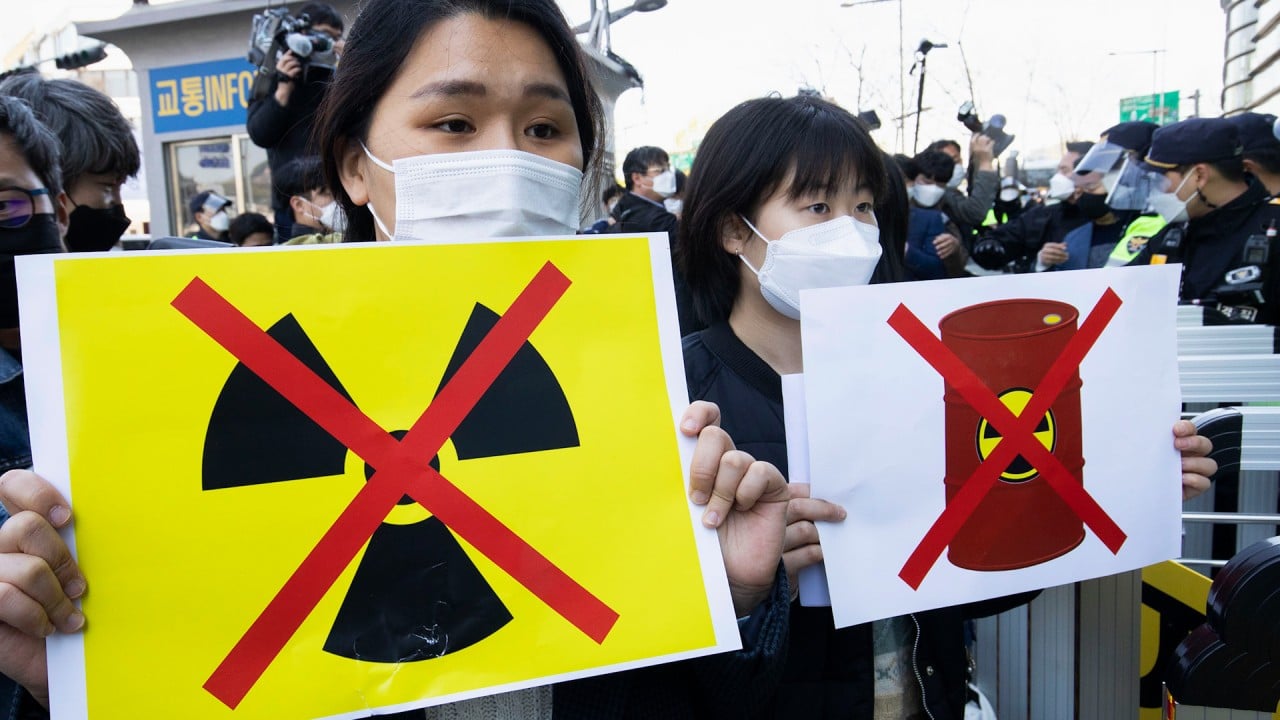
Why fears remain about Japan's plan to release treated Fukushima nuclear plant water into the sea
Tokyo insists that radiation levels in the water will be below international safety standards, an assessment supported by the United Nations’ nuclear watchdog, the International Atomic Energy Agency (IAEA).
Neighbouring countries are far from convinced. Pacific island nations fear the water will contribute to nuclear contamination of the so-called Blue Pacific.
South Korea is on edge with panicked consumers buying sea salt, and seafood markets stepping up the frequency of radiation tests. The Seoul government, however, said yesterday that it respected the IAEA review.
China has extended its ban on edible imports from 10 Japanese prefectures, including Fukushima, and will require full screening of all shipments from other regions instead of spot checks.
Customs officials said Tokyo “failed to fully reflect expert opinions” and “all necessary measures” must be taken ensure the safety of Chinese consumers, who are already boycotting cosmetics from Japan.
IAEA did not fully consult experts in Fukushima report: Chinese researcher
7 Jul 2023
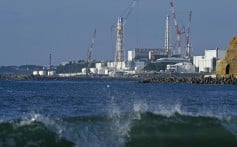
Yesterday, Chief Executive John Lee Ka-chiu said the government was considering an outright ban on food from high-risk areas. Hong Kong currently does not allow imports of live or frozen aquatic products from Fukushima and four neighbouring prefectures without a certificate showing they are free of radiation.
Such action will deepen concerns among those in Japan’s fishing industry who have already voiced opposition to the plan saying it will only increase reputational damage from the initial disaster.
The liquid is too dangerous to simply leave in place, so it seems unlikely that Japan will change its plans.
Radiation cannot be seen or felt, so it is often feared regardless of whether it exists at benign natural levels or dangerous doses.
It is understandable that grave concern has been raised by Japan’s plans to release radioactive water from its wrecked Fukushima Daiichi nuclear plant into the Pacific Ocean.
The water was contaminated while cooling three reactors that melted down after a massive 2011 earthquake and tsunami that hit the country’s coast killing thousands of people. For 12 years, the waste liquid has been stored on-site in 1,000 huge tanks that are now nearly full.
Japan has proposed resolving the crisis by filtering and diluting the water before releasing it through an underwater tunnel that stretches 1km (0.6 miles) into the ocean.

Why fears remain about Japan's plan to release treated Fukushima nuclear plant water into the sea
Tokyo insists that radiation levels in the water will be below international safety standards, an assessment supported by the United Nations’ nuclear watchdog, the International Atomic Energy Agency (IAEA).
Neighbouring countries are far from convinced. Pacific island nations fear the water will contribute to nuclear contamination of the so-called Blue Pacific.
South Korea is on edge with panicked consumers buying sea salt, and seafood markets stepping up the frequency of radiation tests. The Seoul government, however, said yesterday that it respected the IAEA review.
China has extended its ban on edible imports from 10 Japanese prefectures, including Fukushima, and will require full screening of all shipments from other regions instead of spot checks.
Customs officials said Tokyo “failed to fully reflect expert opinions” and “all necessary measures” must be taken ensure the safety of Chinese consumers, who are already boycotting cosmetics from Japan.
IAEA did not fully consult experts in Fukushima report: Chinese researcher
7 Jul 2023

Yesterday, Chief Executive John Lee Ka-chiu said the government was considering an outright ban on food from high-risk areas. Hong Kong currently does not allow imports of live or frozen aquatic products from Fukushima and four neighbouring prefectures without a certificate showing they are free of radiation.
Such action will deepen concerns among those in Japan’s fishing industry who have already voiced opposition to the plan saying it will only increase reputational damage from the initial disaster.
The liquid is too dangerous to simply leave in place, so it seems unlikely that Japan will change its plans.
But since releasing more than 1 million tonnes of water may take two to three decades, Tokyo must diligently monitor the discharge for as long as it takes.
It is imperative that those authorities concerned act responsibly and provide clear, transparent details about how such hazardous waste is being handled, since failure to get it right may have a profound impact on public health.
It is imperative that those authorities concerned act responsibly and provide clear, transparent details about how such hazardous waste is being handled, since failure to get it right may have a profound impact on public health.

No comments:
Post a Comment